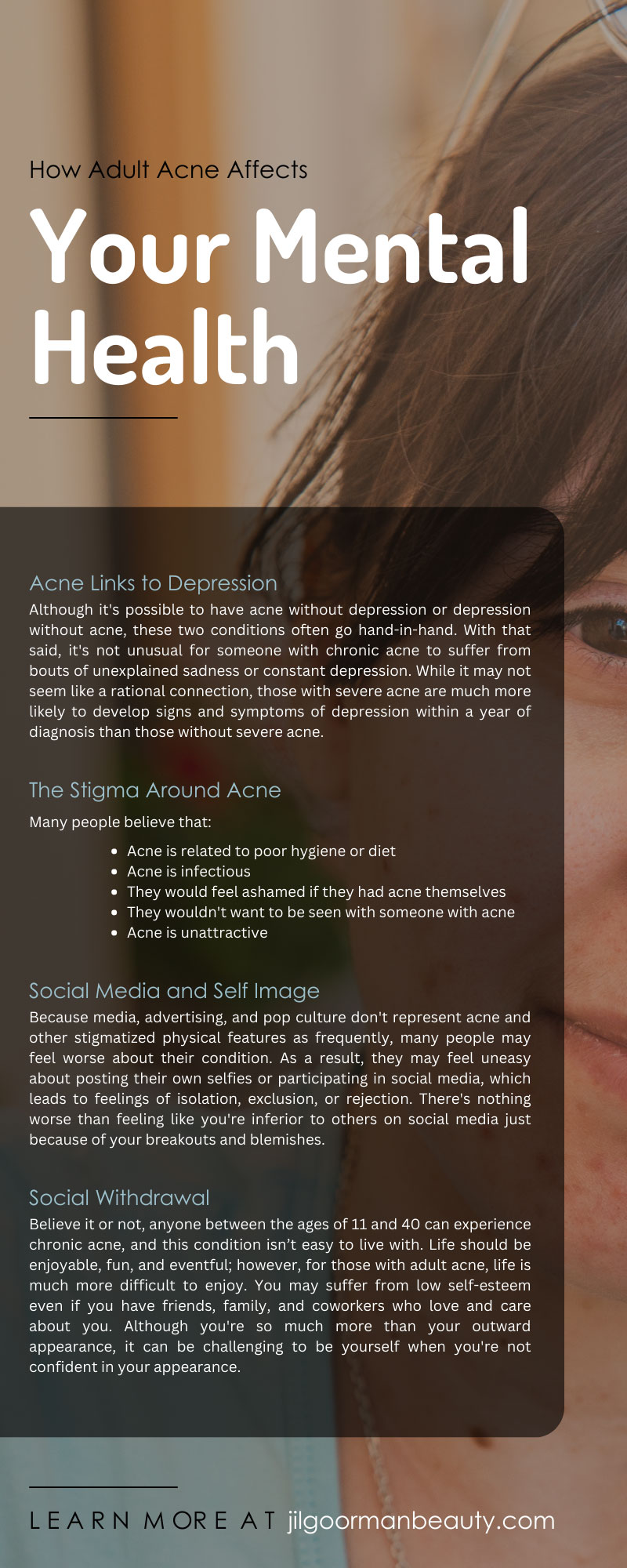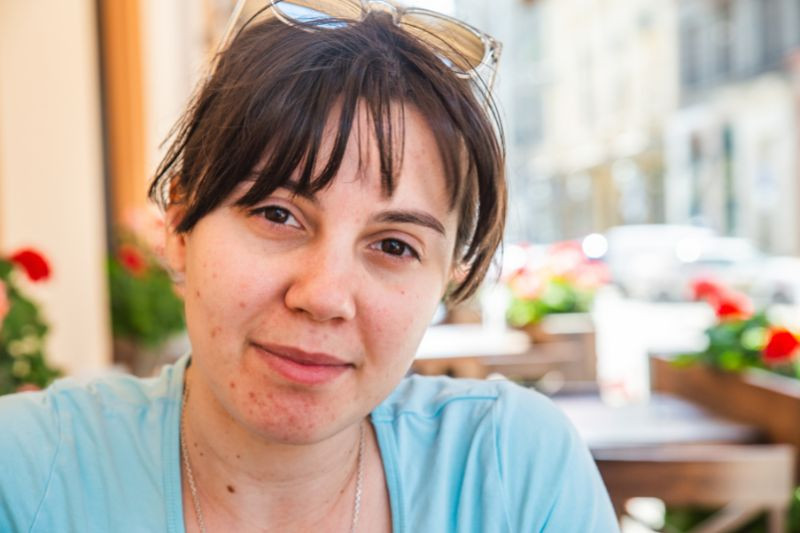Life is hard enough even with clear, normal skin, but acne and other skin conditions can wreak havoc on your mood. Whether you suffer from chronic acne or the occasional breakout, you may wish you could've left the pimples in your teenage years. Unfortunately, many people don't get to leave acne in their past; if you can relate, consider how adult acne affects your mental health.
Acne Links to Depression
Although it's possible to have acne without depression or depression without acne, these two conditions often go hand-in-hand. With that said, it's not unusual for someone with chronic acne to suffer from bouts of unexplained sadness or constant depression. While it may not seem like a rational connection, those with severe acne are much more likely to develop signs and symptoms of depression within a year of diagnosis than those without severe acne.
It's no secret that most people suffer from hormonal acne in their teenage years; therefore, most teens aren't overly fixated on it because their peers also have blemishes. On the other hand, acne dissipates for most as they become adults—as a result, adults with acne may experience mental distress because they feel out of place.
The Stigma Around Acne
Unfortunately, our society has unrealistic beauty standards. With that in mind, there's often an unfair stigma around acne and other skin conditions. If you have acne—especially in adulthood—you may worry about what others think of you and how they view you. Believe it or not, many people carry untrue or unfair beliefs about acne and other skin concerns.
Many people believe that:
- Acne is related to poor hygiene or diet
- Acne is infectious
- They would feel ashamed if they had acne themselves
- They wouldn't want to be seen with someone with acne
- Acne is unattractive
Even if some people won't come out and say it, they may have unfair and irrational thoughts about acne and those suffering from it. Unfortunately, this stigma will probably always have value in our society; however, acne is nothing to feel ashamed of.
Social Media and Self Image
In addition to the unfair stigma around abnormal skin conditions, social media also plays a significant role in adult acne's impact on mental health. Our society is obsessed with showcasing physical features on social media, and that concept can wreak havoc on self-esteem and cause other mental issues.
Because media, advertising, and pop culture don't represent acne and other stigmatized physical features as frequently, many people may feel worse about their condition. As a result, they may feel uneasy about posting their own selfies or participating in social media, which leads to feelings of isolation, exclusion, or rejection. There's nothing worse than feeling like you're inferior to others on social media just because of your breakouts and blemishes. These seemingly small feelings can quickly add up to anxiety or depression.
Social Withdrawal
Believe it or not, anyone between the ages of 11 and 40 can experience chronic acne, and this condition isn’t easy to live with. Life should be enjoyable, fun, and eventful; however, for those with adult acne, life is much more difficult to enjoy. You may suffer from low self-esteem even if you have friends, family, and coworkers who love and care about you. Although you're so much more than your outward appearance, it can be challenging to be yourself when you're not confident in your appearance.
As a result of low self-confidence, adults with unwanted acne may begin to withdraw from social events and relationships with friends and family and become reclusive. This is especially true for young adults who are in college, where social events are one of the top priorities. Even if they receive an invite or make friends at school, college students who suffer from severe acne may avoid spending time with friends, meeting new people, or attending parties and other events in fear that people will judge their appearance.
Acne Can Cause Emotional Pain
Almost everyone experiences pesky breakouts at some point in their life. If you experienced this as a teenager, you're probably no stranger to unnecessary bullying. Your acne may have contributed to your less-than-desirable high school experience, and being called terrible names can leave lasting emotional pain.
In fact, you may carry the worry of being teased or bullied with you; as a result, you'll feel on edge or anxious about being seen if your acne follows you into adulthood. Severe acne isn't uncommon, yet many people treat it like a rare, infectious disease. Unfortunately, the emotional effects of acne are much worse than the physical symptoms themselves.
Nobody should ever have to fear going out in public because of their appearance, but our society's unrealistic beauty standards are sometimes impossible to reach. Furthermore, many people with acne avoid interviewing for jobs, dating, or hanging out with friends for fear of judgment or rejection because of their skin.
Early Treatment Matters
The longer your acne persists, the more likely it is to diminish your mental health and leave lasting acne scars on your skin. Additionally, your acne may worsen without proper treatment, which can further affect your mental stability. Whether you have a few breakouts or chronic cystic acne, you shouldn't let your condition deteriorate.
Once your acne is persistent enough to bother you, you should do something about it. For many people, a gentle facial cleanser for acne-prone skin is enough to stop the acne dead in its tracks. Others may require salicylic acid or benzoyl peroxide treatments to treat their blemishes and breakouts. On the other hand, some people may require prescription-strength medications or topical creams to reduce the appearance and reproduction of their pimples.
Although having clear skin isn't everything, early acne treatments can spare some people from the emotional distress and acne scars that come with long-term severe blemishes. Whether or not you have an existing skincare routine, changing your daily routine to cultivate clear skin is an excellent way to combat acne.
Now that you know how adult acne affects your mental health, you may be more diligent about ensuring you don't suffer from extreme acne. Although many people can't find relief in acne treatments, many cases are curable with the proper skincare routine, products, nourishing diet, and proper hydration.


